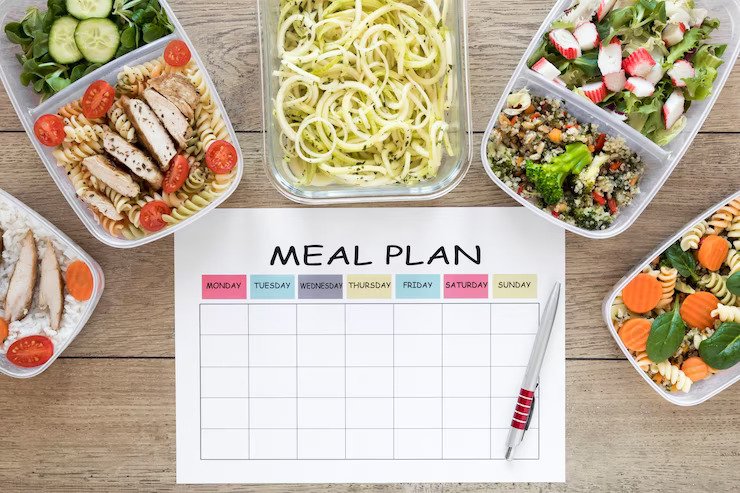Healthy Food: Maintaining a well-balanced diet is essential not only for our physical well-being but also for improving mental clarity and overall vitality. In a world where quick meals and processed nibbles frequently lure us, making an intentional attempt to include wholesome options in our day-to-day meals stands as a potent stride towards a fitter and more contented life. Here are some handy pointers to aid you in consuming nutritious food daily and embracing a nurturing way of life.
1. Prioritize Whole Foods:
Whole foods, such as fruits, vegetables, whole grains, lean proteins, and healthy fats, should form the foundation of your diet. These foods contain vital nutrients, fiber, and antioxidants that promote optimal health. Aim to include a variety of colors in your meals, as different hues often signify different nutrients.
2. Plan Your Meals In Healthy Food:

Meal planning can greatly assist in making healthier food choices. Set aside some time each week to plan your meals and create a shopping list. Having a well-thought-out plan reduces the likelihood of impulsively reaching for unhealthy options when hunger strikes.
3. Cook At Home:
Cooking your own meals allows you to have complete control over the ingredients you use. This empowers you to choose healthier cooking methods, control portion sizes, and experiment with nutritious recipes. Cookery can also be a delightful and fulfilling activity that fosters a stronger sense of connection with the food you prepare.
4. Control Portion Sizes:
Even healthy foods can contribute to weight gain if consumed excessively. Pay attention to portion sizes and try to eat mindfully. Listen to your body’s hunger and fullness cues, and avoid eating until you’re overly stuffed.
5. Snack Smartly:

Snacking can be a part of a healthy diet, as long as you choose nutritious options. Opt for whole-food snacks like nuts, fruits, yogurt, or cut-up vegetables. Avoid mindless snacking by portioning out snacks in advance.
6. Stay Hydrated:
Drinking an adequate amount of water throughout the day is crucial for overall health. Sometimes, our bodies can confuse thirst with hunger, leading to unnecessary snacking. Carry a reusable water bottle with you to remind yourself to stay hydrated.
7. Limit Processed Foods:
Processed foods often contain high levels of unhealthy fats, sugars, and sodium. While it’s okay to enjoy them occasionally, make an effort to minimize their presence in your daily diet. Focus on whole, minimally processed options instead.
8. Read Food Labels:
When shopping for packaged foods, take a moment to read the nutrition labels. Pay attention to serving sizes, calories, added sugars, and the list of ingredients. Choose options with shorter ingredient lists and recognizable ingredients.
9. Practice Moderation:

Depriving yourself of occasional treats can lead to feelings of restriction and frustration. It’s okay to indulge in your favorite treats every now and then, but practice moderation to maintain a balanced approach.
10. Educate Yourself:
Continuously educate yourself about nutrition and its impact on your health. Stay updated on the latest research and recommendations. This knowledge will empower you to make informed decisions and adapt your diet accordingly.
11. Gradual Changes:
Transitioning to a healthier diet doesn’t have to happen overnight. Implement changes gradually to give yourself time to adjust. Small, sustainable changes are more likely to become long-term habits.
12. Seek Support:
Embarking on a healthy eating journey is often more successful when you have support from friends, family, or even a nutrition professional. Share your goals and progress with others to stay motivated and accountable.
Also Read : How Eating Nutrient-Rich Foods Can Completely Change Your Life!
In conclusion, adding healthy and nourishing meals to your daily diet is like making a promise to yourself, and it leads to feeling better and more energized. When you choose whole, natural foods, plan out your meals, cook them at home, and make smart choices, you’re basically setting up a way of eating that’s good for you in the long run. Remember, it’s all about moving forward, not being flawless, so take pleasure in every step you take and keep aiming for a healthier life. Both your body and your mind will really appreciate it.
FAQs
1.Why are whole foods important for a balanced diet?
Whole foods like fruits, vegetables, whole grains, lean proteins, and healthy fats contain essential nutrients, fiber, and antioxidants that support overall health. They provide sustained energy, aid digestion, and contribute to improved mental clarity.
2.How can I control portion sizes effectively?
Pay attention to your body’s hunger and fullness cues. Eat slowly and mindfully, giving your brain time to recognize when you’re satisfied. Using smaller plates and bowls can also help with portion control.
3.Can I include snacks in a healthy diet?
Yes, snacking can be a part of a healthy diet. Choose whole-food snacks like nuts, fruits, and yogurt. Portion them out ahead of time to prevent overindulgence, and be mindful of the nutritional content of your snacks.
4.Why should I limit processed foods?
Processed foods often contain high levels of unhealthy additives, sugars, and fats. Consuming them in excess can lead to health issues. Focus on whole, minimally processed options to provide your body with more nutrients and fewer empty calories.
5.How do I make gradual dietary changes?
Instead of making drastic changes overnight, start by incorporating one or two healthy habits at a time. For example, you could begin by drinking more water and including an extra serving of vegetables each day. Gradually build on these changes over time.
Source Image : freepik.com
